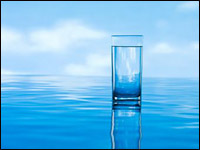When sciatica type symptoms get the better of you and nothing you do seems to make it better, here is something you can do for pain relief every day from my checklist for corrective actions and treatments Part 2.
 Keep hydrated. Water is essential to healthy muscles and joints. Every process in your body requires water. In my Neuromuscular Therapy center near Boston, I have seen patients recover from pain complaints with a few appointments to manually release muscle tension and Trigger Points and then simply an increase in their water intake.
Keep hydrated. Water is essential to healthy muscles and joints. Every process in your body requires water. In my Neuromuscular Therapy center near Boston, I have seen patients recover from pain complaints with a few appointments to manually release muscle tension and Trigger Points and then simply an increase in their water intake.
To understand why, here are a few images. Think of a juice concentrate. It’s really strong tasting as a concentrate. The more water you add the less of the juice you taste. Now think of a strong acid. If you put it on your skin straight, it can “burn,” causing damage. If you dilute an acid, it can be safe, even edible. Now think of those acids inside your body bathing your nerves and muscles. Undiluted acids in the fluids of your body can be irritating. Drinking fluids dilutes those fluids.
Another image is a car engine. If it doesn’t have enough oil, the parts rub together creating friction and heat. Eventually the heat causes damage. In your body, water acts as a lubricant, preventing inflammation from tissues rubbing together. Inflammation equals heat. Heat causes pain. Water cools the heat.
Now think of a boat transporting essential products into a port. Water is the means of transport in the body, feeding the soft tissues of the body with the essentials for healthy tissue and removing waste products that cause pain. If it doesn’t dissolve in water, then it is carried by water.
Almost all of the chemical reactions in our bodies take place in the presence of water. Without it we cannot live. Metabolism, temperature control, elimination, blood volume and pressure, and the health of every cell depend on water. The muscles are 70-75% water, blood is 82% water, even your bones are 25% water and those figures are just a start in understanding it’s importance, especially in relieving pain. Chronic muscle aches and pains are one of the symptoms of a lack of water.
The formula I use for a general guideline is: Your weight divided by two equals the number of ounces of water you should consume each. Some factors like medications and alcohol increase that requirement. A passionate plea for the medical community to understand it’s curative powers is presented in The Body’s Many Cries for Water by Dr. Batmanghelidj. Some think it is an extreme view, but it will open your eyes.
What you say concurs with what the VA chiropractor told me: Keeping hydrated is one of the best things you can do if you have sciatica, as I do. I even noticed a distinct weakening of my leg muscles when I had diarrhea for almost 2 weeks. Now I try harder to stay hydrated.